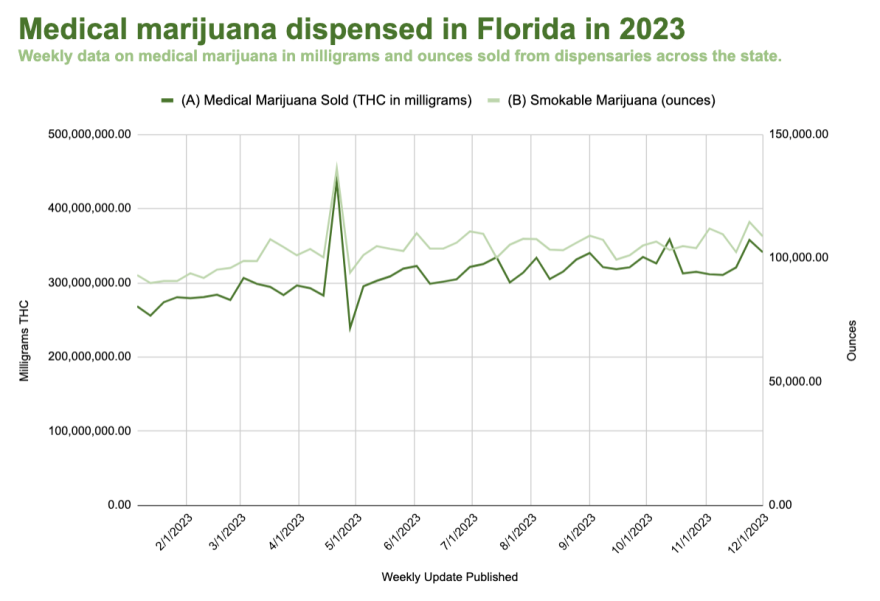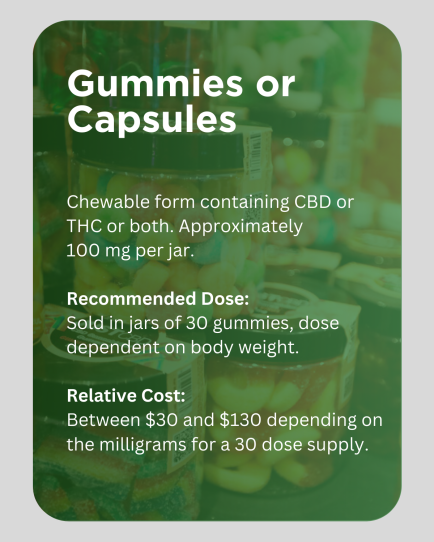Watch above: Maggie Stormant, left, and her daughter Rachel Stormant talk at their home in Palm Coast about their experiences gaining their medical marijuana cards. They both support a proposed ballot initiative to legalize recreational use in Florida. (Serra Sowers, WUFT News)
Only one southeastern state has legalized marijuana for medical use: the Sunshine State, known for “the Florida Man,” tales of wacky adventures, and for many an increasingly open-minded outlook on adult recreational use of cannabis.
A statewide ballot initiative proposed by political group Smart and Safe Florida could potentially put legalizing marijuana before voters in November 2024. The state Supreme Court has until April 1 to decide whether to let that measure onto ballots in the general election.
Ballot initiatives are only considered for language review by the court once they receive petition signatures from 8% of the number of voters in at least half of Florida’s congressional districts – and in the state as whole – as of the last presidential election. That means more than 800,000 signatures. Smart and Safe Florida has over one million signatures for the 2024 initiative. Once on the ballot, at least 60% of voters in favor is required to approve the measure.
As of Nov. 16, Smart and Safe Florida reported over just under $40 million in contributions since August 2022. The campaign has spent all but $45,000 of that amount, records show.
Advocates say the spending demonstrates immense interest in the adult use of marijuana in Florida. Current medical marijuana data concurs. In 2023, the number of users with medical marijuana cards distributed by the state grew from 781,000 a year ago to 855,000 active cardholders as of Nov. 20.
But it isn’t just about the number of cardholders. Medical marijuana dispensed on a weekly basis would be enough to create between 3.9 million and 7.2 million 60-milligram THC edibles, according to the Florida Office of Medical Marijuana Use.
Looking at population data from the 2020 U.S. Census, 21,538,187 people live in Florida. Of those, 17,082,510 people are 21 or older, meaning they could buy marijuana if the initiative passes. The current number of eligible cardholders equates to 5% of the state’s adult population.
This year, Ohio legalized recreational marijuana via a citizen-led ballot initiative. Delaware and Minnesota did so this year, too, but through the legislative process instead of asking voters.
States like Pennsylvania and Arkansas are most similar to Florida under current marijuana laws. Both require individuals to register for a medical card and users to have a valid prescription to buy from dispensaries.
WUFT News spoke with medical users, physicians and marijuana advocates to discern what legalization for adults might mean in Florida, and how 2024 could shape its consumption.
USERS
A mother and daughter sit on their porch of their beach condo in Palm Coast, an hour south of Jacksonville. The breeze flows through their hair. Rachel Stormant, the daughter, pulls from a small backpack her medical marijuana jars, containers and bong.
Stormant describes medical marijuana as a vital part of her daily routine now that she has a medical marijuana card. She said her first-time using marijuana was a curious teenager on a trip to Chicago. Immediately after, she felt guilty and told her mom.
Maggie Stormant laughed it off. She did the same thing when she was 16. Neither said they had a positive experience the first time, but both would decide to try it again for medical purposes.
Maggie had a hard time sleeping after turning 55 in 2016. She said of CBD, a less potent cannabinoid similar to THC: “It made me uneasy. It would give me an anxious, down feeling.”
The next year, upon learning she may be a candidate for medical marijuana from her physician, Maggie was approved for a medical card. It took nearly two months to get her first one, and she has renewed it every 222 days as required ever since.

Neither Maggie nor Rachel mind buying marijuana. The most expensive part was the medical card itself, around $200 for the doctor’s visit and card registration. They said acquiring their cards was simple and quick. “The process was easy,” Rachel said. “It took about a week, but I was able to use it immediately after 72 hours. I could use my ID into a dispensary and got weed.”
Both Maggie and Rachel prefer the sativa strain of marijuana over the indica or hybrid supplies. Every night around 9, the mother goes to her backyard, smokes and then goes to sleep. (She started with making brownies, but switched to vapor when realizing it could be more affordable.) The daughter uses a combination of marijuana forms (tinctures, flower or vape) multiple times per day to help manage her ADHD (attention deficit/hyperactivity disorder) and anxiety.
The Flowery, a statewide dispensary in Florida, estimates that vapes and carts – the refills for vapes – can cost between $30 and $65 for a 30-day supply. Patients can only buy up to 70 days of supply because of their prescription restrictions.
Rachel said she prefers to consume flower, despite the greater expense. Every two weeks, she said, she spends roughly $150 out of pocket to supply her medical marijuana. “I smoke two buds per day,” she said. “It gets a little expensive, but I try to be careful.”
PHYSICIAN

Just east of the University of Florida campus in Gainesville, at a small, nondescript building on Fourth Avenue, a sign outside promotes a website and phone number. Inside, Santorini, a Goldendoodle, sits in the reception area of the Florida Marijuana Doctors practice. Dr. Justin Davis, the medical marijuana physician, sees patients Monday through Friday.
Davis consults with patients, writing prescriptions, educating them on treatment plans and fostering relationships. He said he sees up to 10 patients per day and 1,000 per year, most of whom come back to see him every seven months. Their ages range from 21 through their 80’s.
Once a family practice doctor in California, Davis said his interest in the medical marijuana industry grew in 2016, when medical marijuana was first legalized in Florida. “I was one of the first people in the state, and probably the very first person in all of north central Florida to be certified as a marijuana physician,” he said.
The ballot initiative process is one that Davis worries could threaten his business. Patients would no longer be required to go to a physician, thus limiting his client base. In that case, he said, he would choose to practice a different kind of medicine instead.
ADVOCATE
The National Organization for Reformation of Marijuana Laws (NORML) advocates for industry-related state and federal legalization. Paul Armentano, the group’s deputy director, said he first joined the fight because he wanted to work on policy that protected bodily autonomy.
“Too often, the conversations we are having about cannabis, particularly at the political level, the science and evidence and even the experts are largely absent from these narratives,” he said.
Armentano blames bipartisan prohibition measures from the ‘70s and ‘80s for the stigma and debate over recreational marijuana use today. He also said that younger politicians and voters – on both sides of the aisle – are more likely to support cannabis legalization than older ones.
Florida is in a unique position among the neighboring states in the southeast, Armentano said. Georgia, Alabama and Louisiana are each dependent on legislative action.
Above: Here's a breakdown of the products that can be bought from dispensaries with a medical marijuana card in Florida. Click through to learn about each one. Source: Trulieve, Source: The Flowery Co. (Photo credit: Associated Press)
“There is no political appetite among legislative leaders in Florida to even consider this issue,” he said. “So that only leaves the ballot initiative process as an option.”
Armentano said he worries that state leaders like Attorney General Ashley Moody and other state legislators may challenge the initiative language, like they have in recent years.
“Gov. DeSantis says he opposes reforming marijuana policy because he doesn’t like the smell,” Armentano said. “As if that’s a justification to arrest 40,000 Floridians a year and give them criminal records. That doesn’t pass the smell test to me.”
According to data from the Florida Department of Law Enforcement court disposition report for 2023, only 4,390 dispositions have been made for marijuana related incidents. The number Armentano stated exaggerates the cases recorded over the last five years, which is 26,410.
DeSantis addressed the idea of marijuana legalization on the campaign trail in Iowa. Although he supported the initial measure for medical usage, he was not ready to see recreational use.
“I think it’s a real, real problem, and I think it’s a lot different than stuff that people were using 30 or 40 years ago. And I think when kids get on that, I think it causes a lot of problems,” DeSantis said. “And then, of course, you know, they can throw fentanyl in any of this stuff now.”
Possessing more than 20 grams of marijuana without a medical license is a felony in Florida. Some cities, like Orlando and Tampa, have already decriminalized marijuana. The punishment for illegal possession of less than 20 grams can be just a fine instead of a misdemeanor.
In Florida, the initiative would not allow individuals to grow marijuana plants at home. Armentano argues that any necessary clarification the initiative language would include in the future might only add to political pushback.
OPPOSITION

Ellen Snelling, chair of the Hillsborough County Anti-Drug Alliance, has been working for substance and drug prevention for the last 20 years. Snelling said her brother and daughter were both affected by using narcotics, and she attributes their addiction to using marijuana. She opposes the possibility of recreational marijuana and thus the ballot initiative.
“Probably the number one form of use is smoked,” Snelling said, “and I personally, 100% don’t think that smoked marijuana is medicine. I’m sorry.”
Some of her biggest concerns are access for children of parents who have marijuana in their homes, and that DUI cases could rise across the state because of its increased recreational use.
Moody and the Florida Chamber of Commerce have been some of the loudest opposition voices since the initiative made its way to the state Supreme Court. Florida Solicitor General Henry Whitaker released a brief when the attorney general filed against the initiative.
"This carefully curated ballot summary misleads in ways that, though sometimes subtle, are likely to influence voters,” Whitaker said, “and to do so in a way that entrenches the sponsor’s monopolistic stranglehold on the marijuana market to the detriment of Floridians. The initiative should be stricken.”
Snelling isn’t hopeful of stopping the force of recreational marijuana advocates, believing the opposition campaign will rely on community-driven advocacy and the work of nonprofits.
“We don’t have millions and millions of dollars,” she said. “It’ll be just kind of a grassroots campaign across the state.”
The next 11 months will determine the course of the initiative, but for now it is up to the state supreme court to decide if voters will see it on the ballot.







